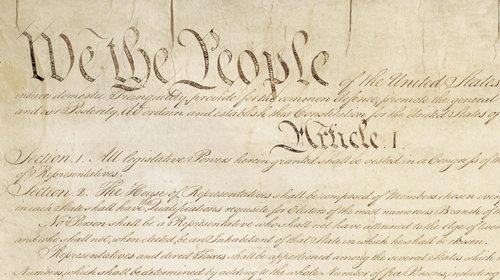
The second coming of the “Stolen Valor” Act (the Supreme Court struck down the first iteration on First Amendment grounds last term) is on the House’s “suspension” calendar today, meaning it will pass with a two-thirds majority vote, without amendment and after 40 minutes of debate. The bill would create additional federal penalties for “fraudulent” representations concerning military decorations.
Were the bill under consideration the original version of Stolen Valor redux—introduced by Rep. Joe Heck (R-NV) and Sen. Scott Brown (R-MA) in 2011—I’d be freaking out. As I explained back in August, H.R. 1775 and its sister bill, S. 1728, as initially introduced, would be Clint Eastwood-scale disasters for free speech.
They would cover any misrepresentation about military service, including white lies or even misleading statements intended to get a girl (or a guy), a drink or a job. Lying about serving in combat or in the special forces (redundant that, no?), or a claim to have won the Medal of Honor, would get you a year in jail and a big fine. Any other misrepresentation? Six months in the pokey and, again, a sizeable fine.
The Heck-Brown version, however, was replaced by a narrower bill, introduced by Rep. Tim Griffin (R-AR), and voted out of committee. The version being considered today would only cover “fraudulent” misrepresentations about military decorations (not military service generally).
While we continue to have serious concerns about possible abusive prosecutions under the measure, it’s a far sight better than the other options. For starters, it would at least require the government to prove that you knew the misrepresentation was materially false, that the other person didn’t know, that it would be reasonable for the other person to believe the lie, that the person in fact acted on the lie, and that damages resulted from the lie. That’s a tough row to hoe (as well it should be).
Now, there’s really no reason to act here at all. Fraud—including fraud respecting the receipt of military decorations—is already illegal under federal and state law, meaning the bill’s unnecessary. Additionally, by targeting only misrepresentations concerning military decorations, even the Griffin version of Stolen Valor is arguably unconstitutional because it discriminates against speech based on its content.
Finally, as Justice Kennedy and Chief Justice Roberts both stressed in the plurality opinion in Alvarez, the case invalidating the first Stolen Valor bill, it’s a simple matter for the government to create a comprehensive and publicly accessible database of military decorations. Think the guy at the bar claiming a Purple Heart is full of it? We live in the age of the smartphone. Dude doesn’t stand a chance.
Note there’s another similar bill in the Senate—the “Military Service Integrity Act”—which I also wrote about in August. It suffers from the same problems as the Griffin amendment, and then some (but is still better than Heck-Brown). To the extent it ends up as the language that goes to the president here, our concerns would be multiplied.
Ultimately, Congress just shouldn’t act here. We’re 60 days from the election, and it’s transparent that this is purely to provide patriotic talking points for the campaign trail (and to do so on this tragic anniversary). Unfortunately, this is a lesser of many evils situation, so to the extent Congress does send a “Stolen Valor: The Return” to the president, let’s hope the version in front of the House today is the least bad of a poor set of options.
Learn more about Freedom of Expression: Sign up for breaking news alerts, follow us on Twitter, and like us on Facebook.



